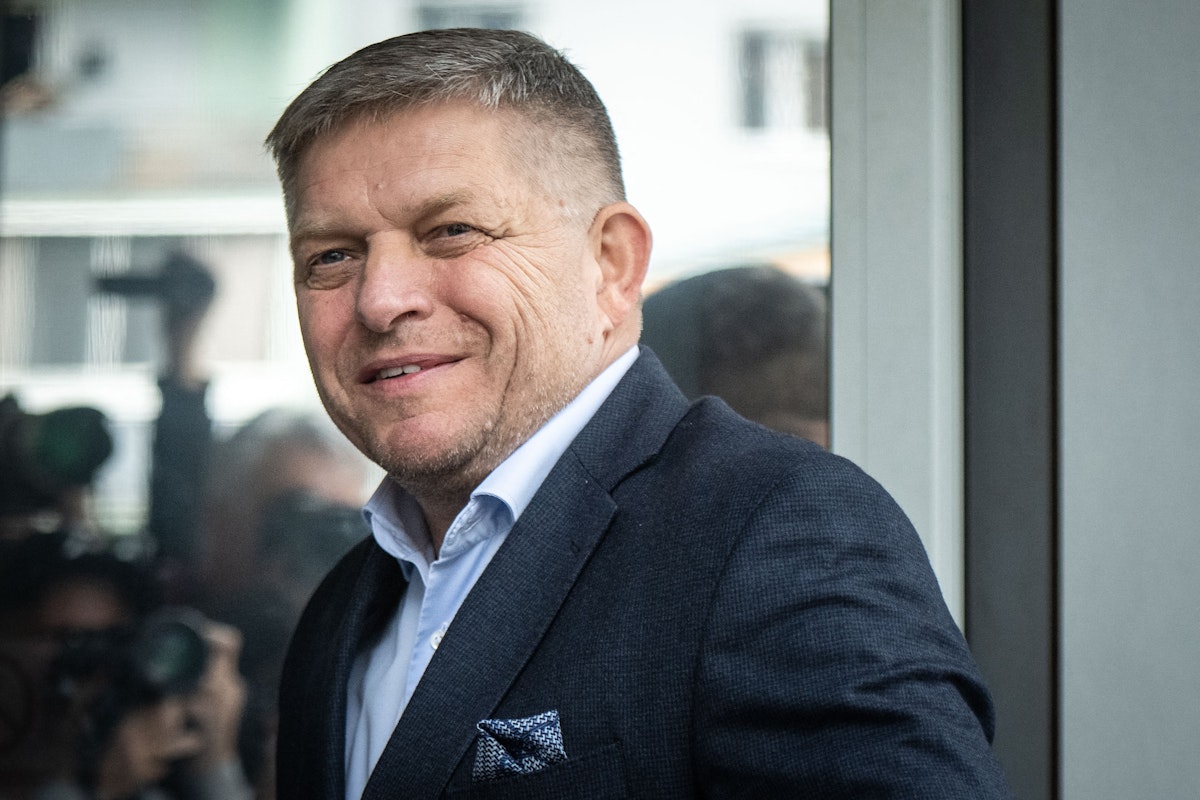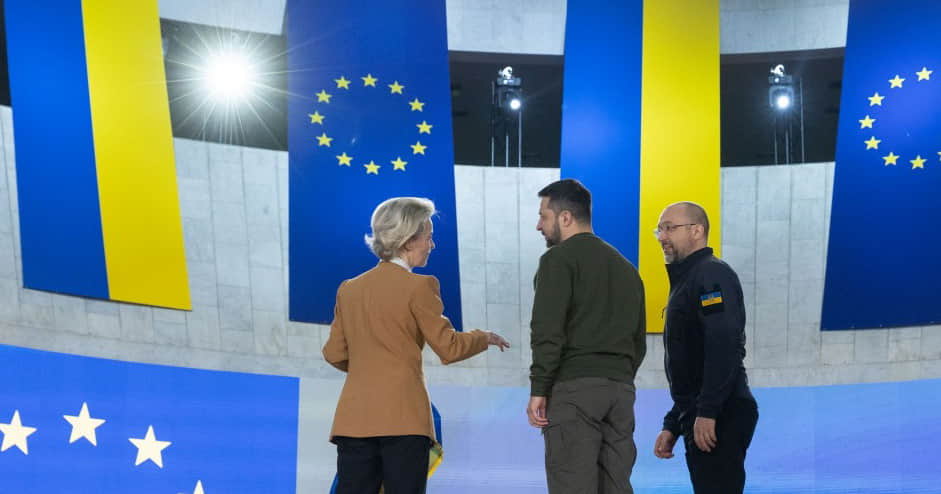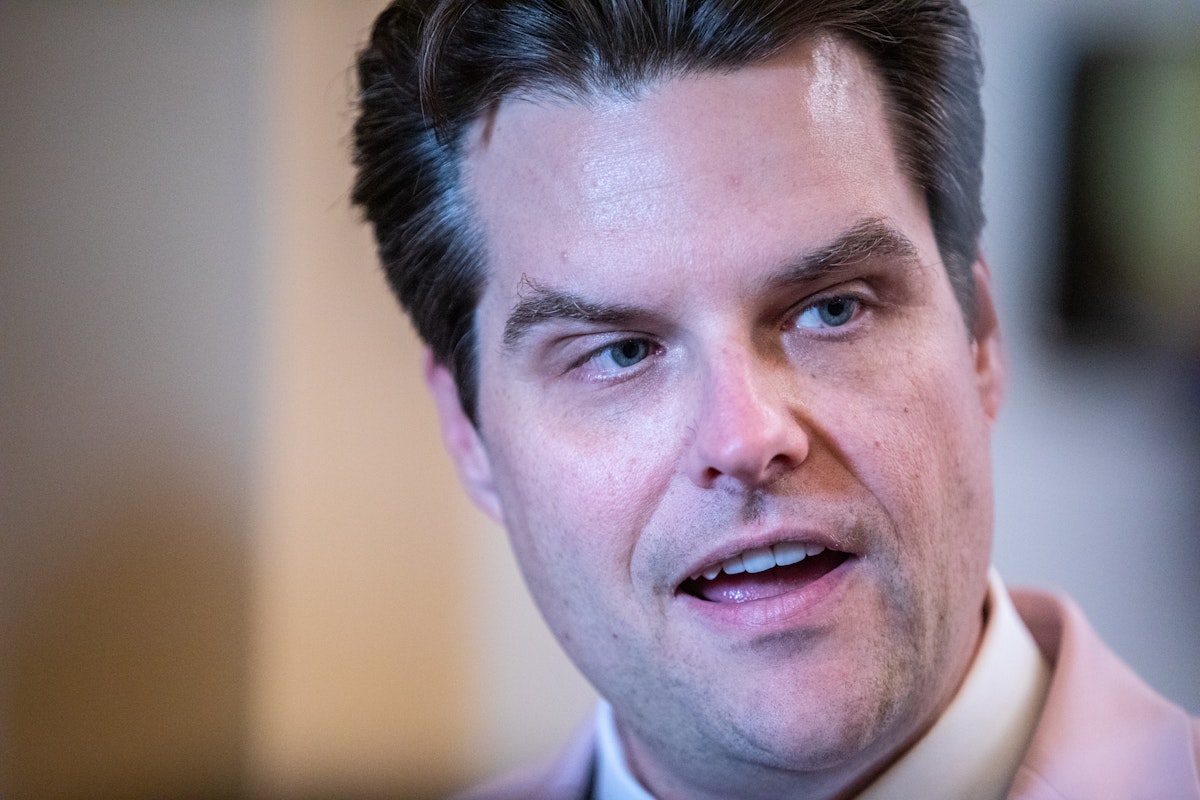Slovakia’s Presidential Election Is A Warning to America
On Saturday, Slovak voters will go to the polls in the first round of the country’s presidential election.The event has understandably attracted little attention in the United States. Slovakia’s population is somewhere between 5 and 6 million, roughly that of Minnesota. Given Gaza, Ukraine, and rising tensions with China, a small central European country is far from the most pressing US foreign policy concern. And 2024 is a crowded year for elections: at least 64 countries, plus the European Union, are headed to the polls this year, including the United States. But America’s own upcoming presidential election is the reason we should pay attention to Slovakia’s—and the domestic political context in which it is taking place. The Slovak presidency is largely ceremonial. But over the last year, the country’s president, Zuzana Čaputová, has helped block certain moves made by its prime minister, Robert Fico, who was returned to power in 2023 five years after resigning in disgrace. She’s refused, for example, to allow a climate change denier to be environment minister and helped stop certain changes to the criminal code reform by sending it to the country’s constitutional court. But she is not running again. Slovakia will soon have a new president, one who may be friendlier to Fico. To look at Slovak politics today is to see what happens when an emboldened aspiring autocrat returns to power, pushes out pro-Russian rhetoric, tries to win immunity for himself, and attacks the media, so that those who report on, say, corruption are seen as enemies of the people. This could, of course, impact American foreign policy: if America’s European allies are not in lockstep on Ukraine, what does that mean for support for Ukraine in its war against Russia? But it is Slovakia’s domestic politics, inextricable from its foreign policy, where, an ocean away, Americans can find parallels to our own. “As in many other western societies, we are deeply divided,” Miroslav Wlachovský, the country’s former minister for foreign affairs, told me over Zoom.Slovakia has long been split between those who are more liberally minded and those with a more populist bent, a division that has become especially salient over the last decade.In 2018, Robert Fico was forced to resign following months of anti-corruption protests — and weeks after the murder of 27-year-old investigative journalist Ján Kuciak and his fiancee, Martina Kušnírová. He was out after six consecutive years in power, replaced by Peter Pellegrini, who was widely seen as more moderate than Fico. In 2019, Čaputová, a progressive, pro-European environmental activist, was elected president, promising to use the position to fight corruption. In 2020, her victory was followed by a new government in parliament. They, too, spoke of anti-corruption and the rule of law. What’s more, it looked, for a moment, like people would be held accountable. Martin Kočner, the financier and real estate tycoon who was believed to have orchestrated Kuciak’s killing, was charged with ordering the murder. (Kočner was also suspected of having ties to Fico). Fico and his close political ally and former interior minister Robert Kaliňák, in 2022, were accused of creating an organized criminal group which allegedly used classified tax information to attack political rivals. But parliament did not approve a motion to lift Fico’s immunity from prosecution while he was being investigated, as had been requested by the Special Prosecutor’s Office. Had Fico remained out of power, it is possible that other attempts to prosecute him for criminal offenses would have moved forward. Then, last June, Čaputová —arguably the most trusted politician in the country—announced she would not seek reelection for the presidency: It was broadly understood that she did not want to spend five more years fighting with the likes of Fico, whom she sued after he called her an “American agent,” and receiving death threats from the prime minister’s supporters. Kočner had been acquitted a month earlier, though a woman believed to be his accomplice was found guilty of Kuciak’s murder. In December 2022, the government fell apart, accused of incompetence and inability to offer, and early elections were held in September of last year. It seemed, for a moment, that the big winner might be Pellegrini, who had broken off to form his own party. Fico, however, was not new to any of this. He had been prime minister from 2006 to 2010, and again from 2012 to 2018. He knew how to play the great game of Slovak politics.Fico is “a very skillful politician when it comes to tools he uses in politics,” said Wlachovský. “He’s also a very cynical politician when it comes to the tools he can use.” Pellegrini was caught between trying to appear moderate and trying to placate the populist, extremist portion of the population. Fico had no such qualms. He smeared his opponents as Soros stooges. He attacked the media. “He tried to paint his opponents as pro-war,” Wlac

On Saturday, Slovak voters will go to the polls in the first round of the country’s presidential election.
The event has understandably attracted little attention in the United States. Slovakia’s population is somewhere between 5 and 6 million, roughly that of Minnesota. Given Gaza, Ukraine, and rising tensions with China, a small central European country is far from the most pressing US foreign policy concern. And 2024 is a crowded year for elections: at least 64 countries, plus the European Union, are headed to the polls this year, including the United States.
But America’s own upcoming presidential election is the reason we should pay attention to Slovakia’s—and the domestic political context in which it is taking place. The Slovak presidency is largely ceremonial. But over the last year, the country’s president, Zuzana Čaputová, has helped block certain moves made by its prime minister, Robert Fico, who was returned to power in 2023 five years after resigning in disgrace. She’s refused, for example, to allow a climate change denier to be environment minister and helped stop certain changes to the criminal code reform by sending it to the country’s constitutional court. But she is not running again. Slovakia will soon have a new president, one who may be friendlier to Fico. To look at Slovak politics today is to see what happens when an emboldened aspiring autocrat returns to power, pushes out pro-Russian rhetoric, tries to win immunity for himself, and attacks the media, so that those who report on, say, corruption are seen as enemies of the people.
This could, of course, impact American foreign policy: if America’s European allies are not in lockstep on Ukraine, what does that mean for support for Ukraine in its war against Russia? But it is Slovakia’s domestic politics, inextricable from its foreign policy, where, an ocean away, Americans can find parallels to our own.
“As in many other western societies, we are deeply divided,” Miroslav Wlachovský, the country’s former minister for foreign affairs, told me over Zoom.
Slovakia has long been split between those who are more liberally minded and those with a more populist bent, a division that has become especially salient over the last decade.
In 2018, Robert Fico was forced to resign following months of anti-corruption protests — and weeks after the murder of 27-year-old investigative journalist Ján Kuciak and his fiancee, Martina Kušnírová. He was out after six consecutive years in power, replaced by Peter Pellegrini, who was widely seen as more moderate than Fico.
In 2019, Čaputová, a progressive, pro-European environmental activist, was elected president, promising to use the position to fight corruption. In 2020, her victory was followed by a new government in parliament. They, too, spoke of anti-corruption and the rule of law.
What’s more, it looked, for a moment, like people would be held accountable. Martin Kočner, the financier and real estate tycoon who was believed to have orchestrated Kuciak’s killing, was charged with ordering the murder. (Kočner was also suspected of having ties to Fico). Fico and his close political ally and former interior minister Robert Kaliňák, in 2022, were accused of creating an organized criminal group which allegedly used classified tax information to attack political rivals. But parliament did not approve a motion to lift Fico’s immunity from prosecution while he was being investigated, as had been requested by the Special Prosecutor’s Office. Had Fico remained out of power, it is possible that other attempts to prosecute him for criminal offenses would have moved forward.
Then, last June, Čaputová —arguably the most trusted politician in the country—announced she would not seek reelection for the presidency: It was broadly understood that she did not want to spend five more years fighting with the likes of Fico, whom she sued after he called her an “American agent,” and receiving death threats from the prime minister’s supporters. Kočner had been acquitted a month earlier, though a woman believed to be his accomplice was found guilty of Kuciak’s murder. In December 2022, the government fell apart, accused of incompetence and inability to offer, and early elections were held in September of last year.
It seemed, for a moment, that the big winner might be Pellegrini, who had broken off to form his own party. Fico, however, was not new to any of this. He had been prime minister from 2006 to 2010, and again from 2012 to 2018. He knew how to play the great game of Slovak politics.
Fico is “a very skillful politician when it comes to tools he uses in politics,” said Wlachovský. “He’s also a very cynical politician when it comes to the tools he can use.” Pellegrini was caught between trying to appear moderate and trying to placate the populist, extremist portion of the population. Fico had no such qualms. He smeared his opponents as Soros stooges. He attacked the media. “He tried to paint his opponents as pro-war,” Wlachovský said of Fico, who took a decidedly pro-Russian approach in the campaign. In October, he became the country’s new prime minister.
Fico’s newest stint as prime minister has been particularly notable for three reasons, all of which may sound familiar to American readers: his pro-Russian rhetoric; his attacks on the media; and his moves against systems that could hold him or his allies accountable.
Fico has harshly criticized the West’s strategy on Ukraine, stressing that it is Moscow that needs security guarantees and has halted Slovak military assistance to Ukraine. He has accused Czech Prime Minister Petr Fiala’s government of having “an interest in supporting the war” and his foreign minister, Juraj Blanár, recently met with Russian Foreign Minister Sergei Lavrov.
All of this is primarily for domestic purposes, said Wlachovský. Only 40 percent of Slovaks believe Russia is primarily responsible for the war: Fico is playing to his base. But domestic politics have foreign policy consequences, and Fico’s policies are causing strain in relations with Slovakia’s close neighbor, the Czech Republic. “I think it’s bad for the country,” said Wlachovský. “Instead of getting more support, we’re losing allies and friends or at least they become reluctant to meet with Slovak officials.”
So far, Fico’s pro-Russian bark has been more pronounced than his bite, which is to say that, thus far, the shift in policy has been largely rhetorical. Szabolcs Panyi, a Hungarian investigative reporter, dubbed him, “pro-Russian in the streets and pro-Western in the meet(ing)s.” But that something begins with words doesn’t mean it shouldn’t be taken seriously, said Zselyke Csaky, a fellow at European Democracy hub.
“So far it’s mostly at the level of rhetoric,” she said. But if one looks at Hungary, Viktor Orban’s “example again shows first you can start with the rhetoric. Then you may proceed to the level of actually blocking steps in the EU.”
Csaky conceded that some of what Fico was doing was “demand driven” — there has always been a portion of the Slovak population that has been more friendly toward Russia. But it’s also supply driven, she said. He is shaping public opinion and then using rhetoric justified by that opinion. And one way he is doing this is his use of media.
Fico has attacked the press for years. In 2016, he called reporters, “dirty, anti-Slovak prostitutes.” But in recent years—years that, to be clear, follow an unprecedented and tragic murder of a Slovak journalist—he has accelerated and intensified his assaults on the media.
“I think it’s much worse than it was in the past,” said Lukáš Diko, editor-in-chief at the Investigative Center of Ján Kuciak (ICJK). Fico and his party, Smer, have long attacked journalists, treating them almost like an opposition party. “But now it’s much more powerful,” Diko explained, “because of his influence on the social networks. What we can say, and we investigated some of the cases of attacks against journalists: When Smer or Fico or some other politician attacked a journalist, it incited hate from ordinary people.”
These are the same journalists who investigate the politicians, who uncover their alleged corruption—and who the prime minister of the country tells people not to trust. “It worked well for them,” Diko said. “People started to trust disinformation and don’t trust so much us or other normal media.”
Fico’s government is also planning a “revamp” of state broadcaster RTVS. This new RTVS would be directly under state control.
I asked Diko about independent journalism’s ability to hold the Slovakian government accountable.
“It’s a bit similar to the situation before the murder,” he told me. “At the time, investigative journalists published a lot of stories of corruption, tax evasion, other crimes that were almost never investigated” by authorities. Journalists can only inform the public. They can only tell the truth. But they cannot decide what those in power or the public at large will do with that information.
Fico’s most notable changes since returning to office, however, have been to protect himself. Old allies are back in power. Kalinak is minister of defense. Fico had considered installing Tibor Gašpar, the former head of the police who was accused of having been involved in organized crime and of illegally ordering a database search on Kuciak prior to his murder, as head of Slovak intelligence. And Fico has dismantled the Special Prosecutor’s Office—the office that had, when he was out of power, asked parliament to lift Fico’s immunity, and that indicted a Fico ally shortly before being shut down.
Still, his efforts have not been without some resistance. People have taken to the streets to protest his Russia policy; his plans to overhaul public broadcasting; and his criminal code reform. Part of that reform was ultimately blocked: Čaputová and the opposition managed to refer it to the country’s constitutional court for review. The European Union, meanwhile, is already issuing warnings to Slovakia. “It would be a mistake to push Slovakia in that basket of countries that are right on the way to authoritarianism and dictatorship without any fight,” said Wlachovský.
On the other hand, protests eventually end. Fico allies have already talked about new legislation that could preempt unfavorable rulings, while Fico himself has suggested the top judge should be ousted. And while Caputova has been something of a check, the leading candidate in the presidential race is Pellegrini—though polls suggest he is in a tight race with the more liberally minded Ivan Korcok. Were he to win, Fico would likely be still more emboldened to plow ahead.
Fico, meanwhile, is working more quickly, and more aggressively, than he did when last in power.
“Fico has learned his lesson,” said Diko. The last time he was in power, his government was more cautious. “They could have done it like Orban, but they didn’t.”
And now? “Now they do things against EU values and common sense very fast and I think it’s because they have this experience of the past.”
They learned that when power comes, it’s to be used, and used to protect oneself from the consequences of using that power. Regardless of which presidential candidate comes out ahead after the first round in Slovakia on Saturday, that’s a lesson Americans—whose former president, Donald Trump, has vowed revenge on political enemies and is reportedly looking into how to dismantle the civil service—would do well to learn, too.



